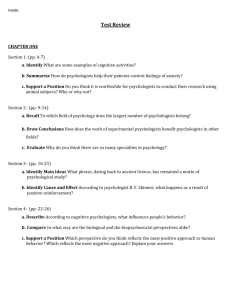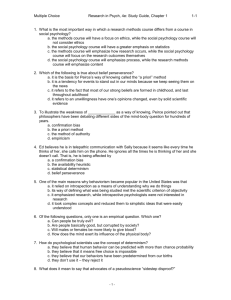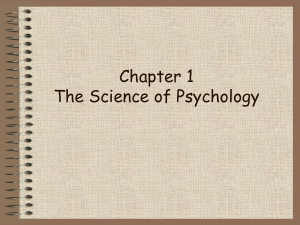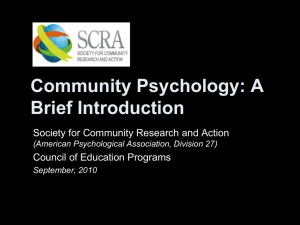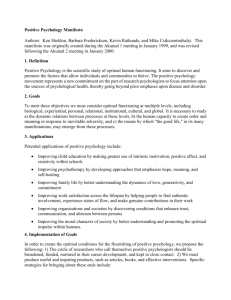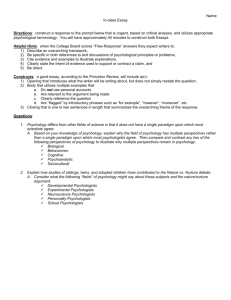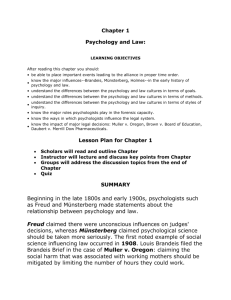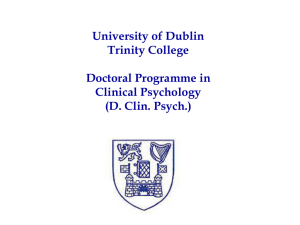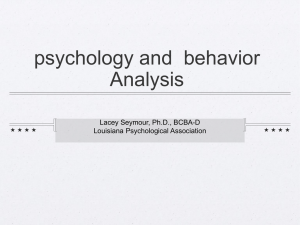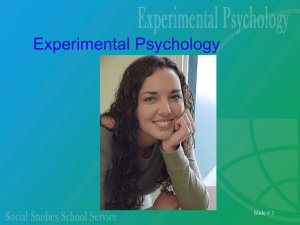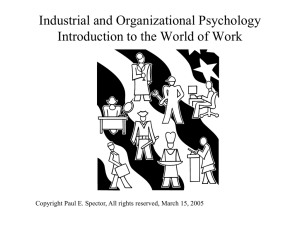Jenkins “Defining Psychology” AP Psych Unit I: Thinking Critically
advertisement
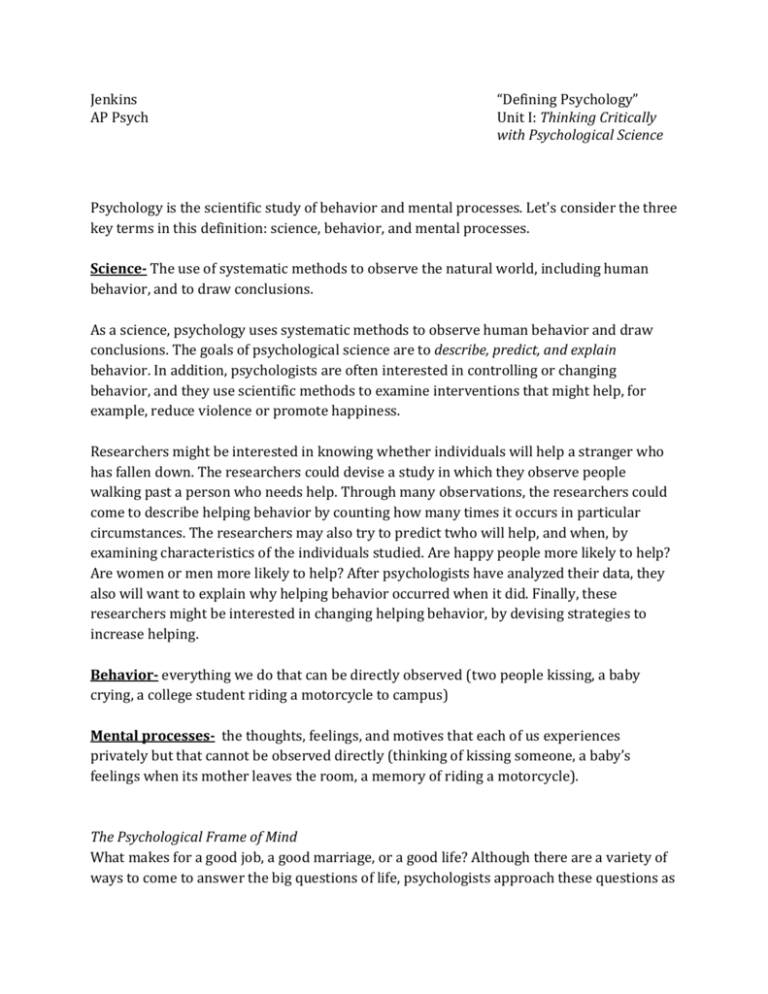
Jenkins AP Psych “Defining Psychology” Unit I: Thinking Critically with Psychological Science Psychology is the scientific study of behavior and mental processes. Let's consider the three key terms in this definition: science, behavior, and mental processes. Science- The use of systematic methods to observe the natural world, including human behavior, and to draw conclusions. As a science, psychology uses systematic methods to observe human behavior and draw conclusions. The goals of psychological science are to describe, predict, and explain behavior. In addition, psychologists are often interested in controlling or changing behavior, and they use scientific methods to examine interventions that might help, for example, reduce violence or promote happiness. Researchers might be interested in knowing whether individuals will help a stranger who has fallen down. The researchers could devise a study in which they observe people walking past a person who needs help. Through many observations, the researchers could come to describe helping behavior by counting how many times it occurs in particular circumstances. The researchers may also try to predict twho will help, and when, by examining characteristics of the individuals studied. Are happy people more likely to help? Are women or men more likely to help? After psychologists have analyzed their data, they also will want to explain why helping behavior occurred when it did. Finally, these researchers might be interested in changing helping behavior, by devising strategies to increase helping. Behavior- everything we do that can be directly observed (two people kissing, a baby crying, a college student riding a motorcycle to campus) Mental processes- the thoughts, feelings, and motives that each of us experiences privately but that cannot be observed directly (thinking of kissing someone, a baby’s feelings when its mother leaves the room, a memory of riding a motorcycle). The Psychological Frame of Mind What makes for a good job, a good marriage, or a good life? Although there are a variety of ways to come to answer the big questions of life, psychologists approach these questions as scientists. Psychology is a rigorous discipline that tests assumptions, bringing scientific data to bear on the questions of central interest to human beings. Psychologists conduct research and rely on that research to provide evidence for their conclusions. They examine the available evidence about some aspect of mind and behavior, evaluate how strongly the data (information) support their hunches, analyze disconfirming evidence, and carefully consider whether they have explored all of the possible factors and explanations. At the core of this scientific approach are four attitudes: critical thinking, skepticism, objectivity, and curiosity. Critical thinking- the process of reflecting deeply and actively, asking questions, and evaluating the evidence. Thinking critically means asking ourselves how we know something. Critical thinkers question and test what some people say are facts. They examine research to see how soundly it supports an idea. Critical thinking reduces the likelihood that conclusions will be based on unreliable personal beliefs, opinions, and emotions. In addition, scientists are characterized by skepticism. Skeptical people challenge whether a supposed fact is really true. Being skeptical can mean questioning what “everybody knows.” There was a time when “everybody knew” that women were morally inferior to men, that race could influence a person's IQ, and that the earth was flat. Psychologists, like all scientists, look at such assumptions in new and questioning ways and with a skeptical eye. Psychology researchers often turn up the unexpected in human behavior. For example, it might seem obvious that couples who live together before marriage have a better chance of making the marriage last. After all, practice makes perfect, right? Yet researchers have found a higher rate of marital success for couples who did not live together before marriage. You might use scientific skepticism the next time you encounter an infomercial about the latest diet craze that promises to help you lose weight “without diet or exercise.” A skeptic knows that if something sounds too good to be true, it probably is. Related to critical thinking and skepticism is the distinction between science and pseudoscience. Pseudo means “fake,” and pseudoscience refers to information that is imbedded in scientific terminology but is not supported by sound scientific research. Astrology is an example of a pseudoscience. Although astrologers may present detailed information about an individual, supposedly based on when that person was born, no scientific evidence supports these assumptions and predictions. One way to tell that an explanation is pseudoscience rather than science is to look at how readily proponents of the explanation will accept evidence to the contrary. empirical method- gaining knowledge through the observation of events, the collection of data, and logical reasoning. Being open to the evidence means thinking objectively. Scientists are objective and believe that one of the best ways to be objective is to apply the empirical method to learn about the world. Using the empirical method means gaining knowledge through the observation of events, the collection of data, and logical reasoning. Being objective involves seeing things as they really are, not as we would like them to be. Objectivity means waiting to see what the evidence tells us rather than going with our hunches. Does the latest herbal supplement truly help relieve depression? An objective thinker knows that we must have sound evidence before answering that question. Last, scientists are curious. The scientist notices things in the world (a star in the sky, an insect, a happy person) and wants to know what it is and why it is that way. Science involves asking questions, even very big questions, such as where did the earth come from, and how does love between two people endure for 50 years? Thinking like a psychologist means opening your mind and imagination to wondering why things are the way they are. Once you begin to think like a psychologist, you might notice that the world looks like a different place. Easy answers and simple assumptions will not do. As you can probably imagine, psychologists have many different opinions about many different things, and psychology, like any science, is filled with debate and controversy. Debate and controversy are a natural part of thinking like a psychologist. Psychology has advanced as a field because psychologists do not always agree with one another about why the mind and behavior work as they do. Psychologists have reached a more accurate understanding of human behavior because psychology fosters controversies and because psychologists think deeply and reflectively and examine the evidence on all sides. To be a truly general science of human behavior, psychology must address all sides of human experience. Surely, controversy is a part of any science. The healthy debate that characterizes the field of psychology can give rise to new psychological perspectives, and this is a sign of a lively discipline. Adapted from: http://www.arc.losrios.edu/Documents/Faculty/BSS/NelsonE/King%20Ch.%201%20part%20One%20Defining%20Psychology.pdf
